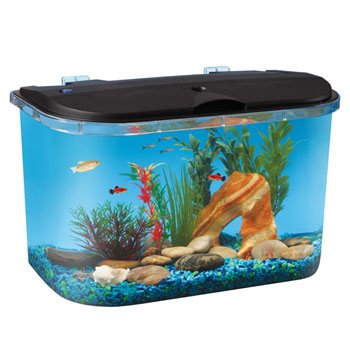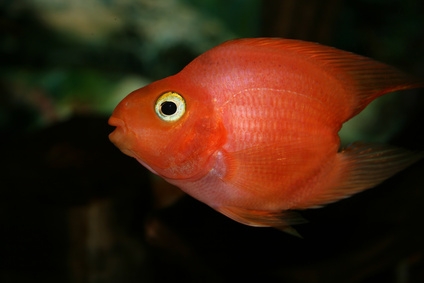
I was raised old school when it came to freshwater fish tanks. One of the first things my mom reminded me to buy as I set up my first tank after moving out was to pick up a large package of aquarium salt. From there I listened to the package which will tell you that all freshwater fish do better with aquarium salt. It will also tell you that you should add one rounded tablespoon for every five gallons of water. This is a lot of salt, should you really add that to your tank?
Reasons to Add Aquarium Salt.
For years almost everyone added salt to their tanks and many local pet stores will still tell those that buy from them that they should be adding large amounts of salt to their freshwater tank. There are a number of reasons that people add salt and some of them are based on truth while others are based on myth.
The basic idea was that by adding a decent amount of salt to your tank you would be doing all of the good things, all of the time. This seemed the best way to keep healthy fish for a long time. While it was an okay idea there are several things that we know now.
The Natural Habitat of Freshwater Fish.
Freshwater fish come from lakes and streams all over the world. Most of these places have very low amounts of salt and some have so little salt that it can't be found even when looking at millions of parts of water. Because of this many freshwater fish aren't really adapted to having salt in their water and it is best to avoid keeping salt in your tank at all times.
Times and Places To Use Aquarium Salt.
There is still a time and a place to use aquarium salt. However, you should learn what fish that you have that can handle the salt if you need to use it for longer periods of time.
Fish That Like a Little Salt.
I think that there are three main reason that many local fish stores recommend adding salt to every tank at all times. First of all there are a lot of people who were raised old school out there. They were told that is what you do and they don't know why one would want to do that or the reasons that it really shouldn't be done, but that's what they do. Second, they have a vested interest in fish keepers adding all sorts of additives to their water. By adding all these extras they have more to buy and the more that a local fish store sells, well the better for them. Finally, many of the fish that the store sells do indeed do well in freshwater with a little salt.
The most common fish that are sold that like a bit of salt are the common live bearers including guppies, swordtails, platies, and mollies. These make up a large percentage of most local fish stores sales and these fish do best with some salt. In fact, platies and swordtails do really well in brackish water and can even be raised and bred in salt water! It is believed that these were saltwater fish that adapted to freshwater conditions and that makes it possible for them to move from one to the other (with gradual introduction).
Cichlids, particularly African cichlids often have salt added to the water. This is particularly good if they do some fighting and injure themselves. However, it should be noted that while many South American cichlids will also do well with a little salt, the Discus fish (a type of South American cichlid) isn't one of them.
Fish That Don't Tolerate Salt.
To the best of my knowledge, all fish can tolerate a moderate amount of salt for awhile. However, many fish do poorly in any amount of salt after a period of time. This includes plecotamus catfish, corydora catfish, most tetras with many of the most common ones on the list including the neon tetra, the cardinal tetra, and rummy nose tetras, elephant noses, discus fish, hatchet fish, and freshwater eels. Bettas often do well with a little salt in their water at first, but quality will decline after a couple of months because they can't live in salt water for long periods of time.
Overall, the thought is a good one, but in reality it isn't a good everyday practice. Use salt to treat some conditions and to make sure that your fish is in its best health, but don't add it to their tank all the time. The one exception to this is if you have a tank full of fish that like a little salt or could use a little salt all the time. Just make sure everyone in the tank will benefit from its use. Make sure you have an idea of what fish you have as well because you will want to keep salt in a tank with those that don't tolerate salt for one month or less and only when absolutely necessary.
 Cloudy Eyes on Aquarium Fish
Cloudy Eyes on Aquarium Fish
Cloudy Ey
Cloudy Eyes on Aquarium Fish
Cloudy Eyes on Aquarium Fish
Cloudy Ey
 Why are there so Many More Shark Attacks?
In 2004 16 year old, J.P And
Why are there so Many More Shark Attacks?
In 2004 16 year old, J.P And
 Tips for Maintaining a Freshwater Aquarium
Here are a few tips for main
Tips for Maintaining a Freshwater Aquarium
Here are a few tips for main
 Dangers of the Deep
While many believe there is
Dangers of the Deep
While many believe there is
 Compatibility Between Freshwater Tropical Fish
Compatibility Between Freshwater Tropical Fish
Compatibility Between Freshwater Tropical Fish
Compatibility Between Freshwater Tropical Fish
Copyright © 2005-2016 Pet Information All Rights Reserved
Contact us: www162date@outlook.com